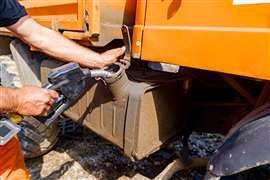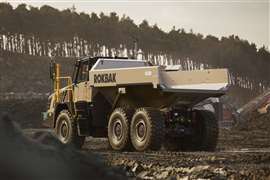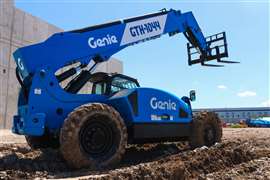How fuel can add to construction’s vehicle maintenance equation
23 November 2023

Construction is one of the world’s most important sectors but globally, it still typically performs with slim margins of roughly 5% earnings. Meanwhile, productivity growth has languished at just 1% per year over the last two decades.
With little margin for error, controlling costs is vital when it comes to shaping a successful construction site. However, between weather forecasts and material costs, this can often seem like a losing battle in what is often an unpredictable operating environment.
Proactive and forward-looking decisions can help prevent potential issues from becoming critical. That is certainly the case when it comes to construction equipment and how the equipment performs.
What is preventative maintenance?
In a journey to becoming more proactive, preventative maintenance is key. It is about taking action today to help avoid unexpected failures in the future. With equipment, this means helping to ensure it is working as it was designed by the manufacturer so that it can operate effectively under the demanding conditions on site.
For example, with diesel engines, protecting against fuel injector deposits – including those on injector nozzles and hidden deposits inside injectors (known as Internal Diesel Injector Deposits, or IDIDs) – can be key to helping injectors work effectively. This in turn helps to promote healthy performance of the injection system, thereby helping to ensure equipment reliability, preventing loss of load-pulling power and wasted energy. The intended result being to avoid unplanned downtime and lower maintenance costs, which for construction sites can kickstart a virtuous cycle by helping to meet deadlines and stay on budget.
How fuel feeds into the equation
Equipment maintenance needs can be dictated by how an individual chooses to operate it; human factors like driving style can have an impact on the performance and lifespan of most assets. However, it is clear that what is put inside equipment is important, with fuel being a prime example.
Alongside the right engine oils and lubricants, fuel can have a notable say on these outputs. A poor quality fuel is ultimately more likely to contribute to detrimental conditions, such as a higher risk of deposit formation on critical engine parts, putting wider operational goals at risk as a result. These goals include that of increased efficiency, which 47% of businesses identify as one of their biggest onsite challenges – making it surprising that only 16% claim to manage their fuel “very effectively”.
Concerns surrounding costs are a factor. Procurement typically accounts for 40-70% of a construction company’s total spend, and while this figure may be primarily focused on materials, it also includes fuel purchases. When you add to this the fact that more than 50% say they could reduce operating costs by 10% or more each month if they were able to manage fuel usage costs effectively, then the opportunity cost of not acting proactively on fuel is clear.
The case for advanced fuel
The engine technologies used in modern construction equipment have continued to advance with the industry and technology developments. The fuel that keeps them running must evolve in turn. What sets today’s advanced fuels apart from their conventional counterparts is often their formulations – the specific combination of active ingredients they include and how these are balanced as part of the fuel’s formula. For instance:
- Deposit control additive – Whether it’s nozzle deposits or IDIDs, this ingredient is designed to work at the heart of the engine to remove injector deposits and prevent further build-up.
- Combustion improver – This helps to protect the Exhaust Gas Recirculation (EGR) system from deposit build-up by controlling the formation of deposit precursors.
- Corrosion inhibitor – Acting like a waterproof jacket for the metal surfaces inside the engine, this helps repel any water, protecting components from corrosion in the process.
- Anti-foam agent – Diesel fuels have a natural tendency to form foam when released from the filling pump, which can cause a stop-start, or even hazardous filling process. This agent reduces the amount of foam and dissipation time, leading to a quicker and cleaner fill with a lower risk of spillage.
- Dehazer – Fuels can pick up water during storage but a dehazer helps to separate that water from the formulation, making housekeeping easier. Keeping fuel clean and dry in this way helps to maintain its condition over time and reduces the risk of microbial growth.
Driven by the need to improve operating performance and reduce emissions, diesel engines are constantly advancing. But the components that make up these engines – from fuel injectors to EGR systems – are highly sophisticated and, therefore, require additional protection to perform at their best.
In an industry where costs are increasing, businesses can’t afford unplanned expenses or unexpected breakdowns risked by poor protection of these components – so it’s vital that they look after the equipment already under their control. Protection that the right fuel can provide, so long as it has the advanced technology needed to overcome the construction industry’s harsh operating environment.
Nadia Haseeb is Global B2B Fuels Marketing Manager, Shell Commercial Fuels.
STAY CONNECTED


Receive the information you need when you need it through our world-leading magazines, newsletters and daily briefings.
CONNECT WITH THE TEAM










